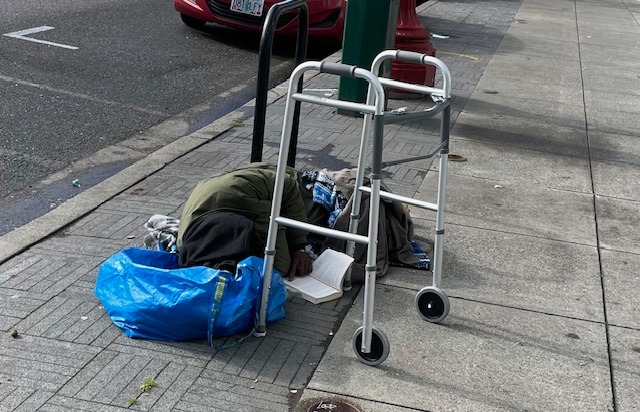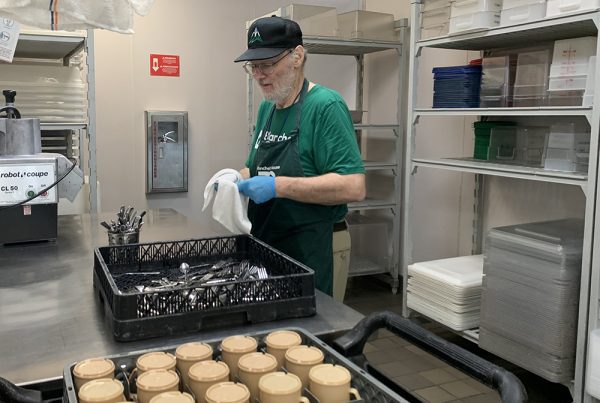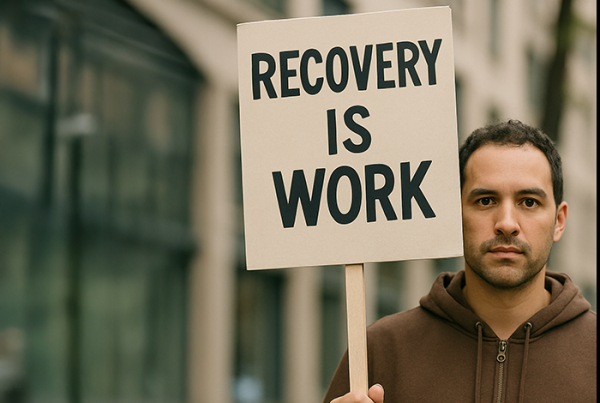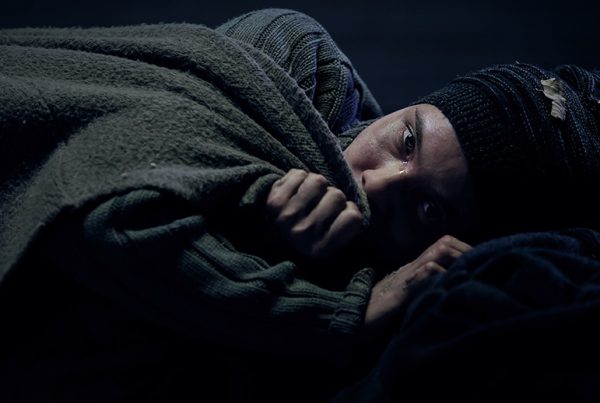Camping Ban, Disability, and Needs of Homeless: Portland’s revised camping ban brought about by a lawsuit advocating for disability rights may conflict with the needs of people experiencing homelessness.
Living with multiple sclerosis for more than 20 years has taught me a lot about disability. Since my diagnosis, I have weathered ebbs and flows, experiencing temporary setbacks like bouts of diminished vision, loss of sensation in my feet and legs, impaired mobility and extreme fatigue. I do not use a mobility device so many people would not know that I have this disability.
Having experienced the challenges of a debilitating chronic illness firsthand, I deeply empathize with the difficulties encountered by people who are non-able-bodied –especially when trying to navigate the city during a homelessness crisis, where tents, carts and other personal survival items block sidewalks and public entrances. That conflict triggered a 2022 lawsuit brought by people with disabilities against the city of Portland. It also, in part, underlies the City Council’s recent adoption of a public camping ban that commits to removing obstacles from the public right-of-way. From this perspective, I understand the rationale behind the ordinance.
But that is not the only perspective I hold. As the executive director of Blanchet House, a nonprofit dedicated to supporting the unhoused by alleviating suffering and restoring dignity, I am acutely aware of the trauma and tragedy faced by our community experiencing homelessness. Over the past four years, the convergence of the housing, mental health and addiction crises has exacted a devastating toll on our community.
Homeless Community Populated by People with a Disability
Standing at the crossroads of personal experience and professional duty, I’m confronted with conflicting sympathies as the city prepares to enforce the new policy. While clearing sidewalks is crucial for those with disabilities, the suffering of homeless individuals, many of whom are disabled themselves, cannot be ignored.
The ordinance, revised from an earlier version, stipulates that camping is unlawful only when “reasonable alternate shelter” is available. “Reasonable” remains elusive with no clear definition. But for disabled individuals experiencing homelessness, reasonable shelter would be shelter that is truly accessible and supportive – a rarity.
In the short-term, state and local governments should identify which shelters meet that standard and keep an inventory of available beds – for instance, which locations not only can be reached by TriMet, but also have accessible restrooms, showers, dining areas and beds.
We Need an Active Inventory of ADA Accessible Shelter Beds
And in the long-term, local leaders must address the housing needs of our disabled, chronically ill and senior community members with a sustained investment and an intentional plan. We will need legislative support at the state level to ensure accessible and affordable housing – both temporary and permanent.
Until it can provide greater access, the city cannot feasibly meet the “reasonable alternate shelter” standard that the ordinance calls for. This would disappoint all involved, as the city’s intention to clear sidewalks and public spaces to comply with the ADA is an understandable one.
To the city’s credit, the ordinance’s repeated emphasis on “reasonable alternate shelter” speaks to the city’s understanding that homelessness is a very nuanced and individualized experience rather than a monolith. In addition, the draft of the city and county’s recently released Homelessness Response Action Plan recognizes the prevalence of disability among our houseless and housing-insecure community members, as well as the need to tailor our response to their unique needs.
Camping Ban is an Opportunity to Increase Services for Citizens with a Disability
The city and county have the opportunity to bolster their words with meaningful actions. And they should understand that the obligation to focus increasingly on accessible housing isn’t just about the homelessness crisis. It acknowledges our aging population and the limits of our current built environment. It is impossible for me to know how my MS will progress. When I was diagnosed, the prognosis for me and everyone else with MS was grim. Tremendous advancements in medical therapies have worked miracles for many MS patients like me.
But the truth of the matter is that whatever one’s health and wellness, everyone is likely to someday experience disability in some way, or at least be called upon to care for someone who is. Everyone who needs shelter and housing – individuals, families, seniors, persons in marginalized communities– will benefit from a focus on shelter and housing that meet the needs of persons with disabilities.
As we navigate these complex intersections of need and challenge, let us not lose sight of our shared humanity and the imperative to extend empathy and support to those most in need, both housed and unhoused. We must commit to providing safe and accessible neighborhoods for our community members with disabilities and housing for people who lack options for shelter and security.


















